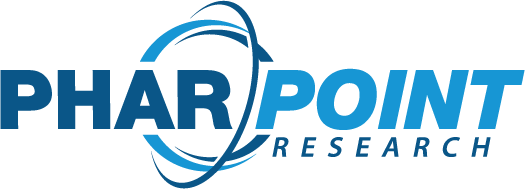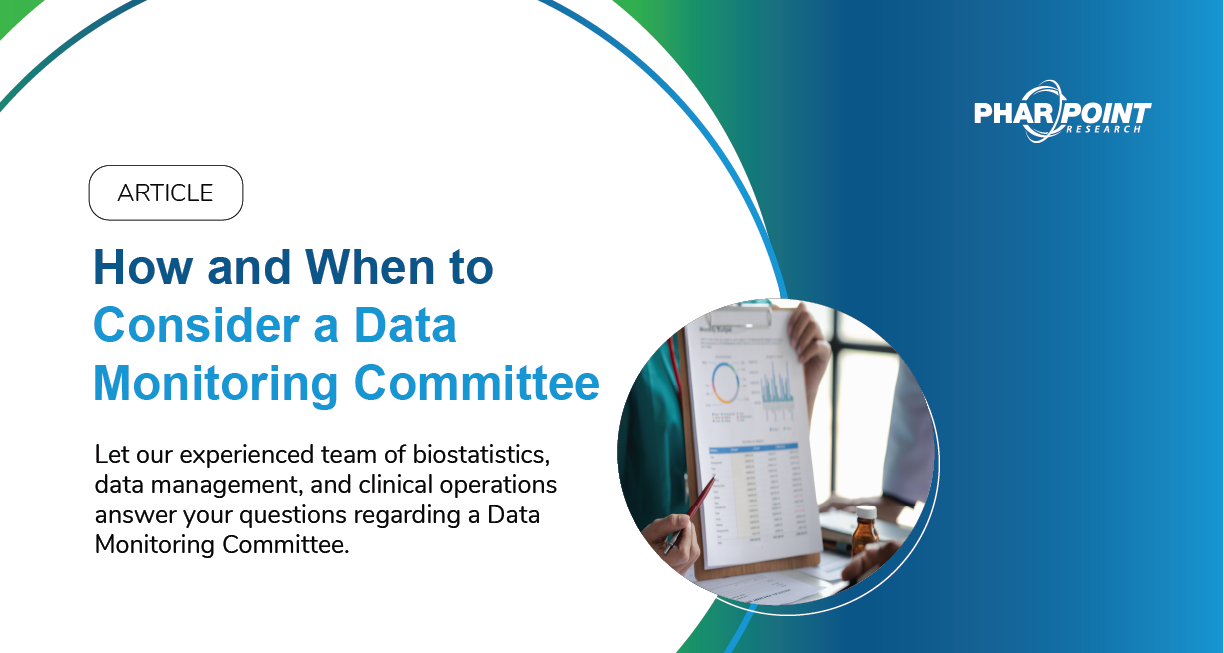How and When to Consider a Data Monitoring Committee
Have you heard the following acronyms: DMC, DSMB, DSMC, IDMC and wondered what they stand for? Or have you ever wondered what is the difference between a DMC and an IDMC? Have you ever wondered if you needed one of these committees for your study and how you should go about forming that committee?
These acronyms are all different terms used to describe the same thing; an independent group of experts who monitor patient safety and may also monitor treatment efficacy data while a clinical trial is ongoing.
This group advises the sponsor regarding the continuing safety of trial subjects and those yet to be recruited into the trial, as well as the continuing validity and scientific merit of the trial. Here is what the acronyms mean:
• DMC: Data Monitoring Committee
• DSMB: Data Safety Monitoring Board
• DSMC: Data and Safety Monitoring Committee
• IDMC: Independent Data Monitoring Committee
For consistency purposes, we will refer to this group of experts as a DMC for the rest of the article today, but any of the previously mentioned acronyms would be acceptable.
Reasons for a DMC:
The fundamental reasons to establish a DMC is to enhance the safety of trial participants and if regular interim analyses of the accumulated data are needed.
When determining if you need to have a DMC, consider if your study meets any of the following criteria:
- Large, randomized, multisite studies
- Controlled trial that compares rates of mortality or major morbidity
- Known safety concerns regarding adverse events, a specific laboratory parameter for the product, or serious toxicity with the study treatment
- If there are a priori reasons for a safety concern due to the invasive administering of the study treatment
- An adaptive design with a formal interim analysis planned
- If the study endpoint is such that a highly favorable or unfavorable result, or even a finding of futility at an interim analysis might ethically require termination of the study before the planned completion
- Study being performed in a fragile population such as children, the elderly, pregnant women, or other vulnerable populations such as terminally ill or diminished mental capacity
- If the trial population is at an elevated risk of more severe outcomes even when the study objective addresses a lesser endpoint
You would likely not need a DMC for the following:
- Trials at early stages of product development
- If the trial addresses outcomes such as relief of symptoms or something similar that is of less concern than mortality and morbidity
Selection Process/Forming the Committee:
The selection of the DMC members is extremely important since the DMC responsibilities relate to the safety of trial participants. The committee should be made up of a minimum of 3 people:
- A medical doctor who specializes in the area being studied
- A medical doctor who either specializes in clinical trials or in the area being studied
- And a statistician with knowledge of statistical methods for clinical trials and sequential analysis of trial data
PharPoint recommends an odd number of voting members to ensure that the vote does not end in a tie. The committee will also usually have a non-voting statistician who serves as the unblinded DMC support statistician.
Consider prior DMC experience when selecting your members. Prior DMC experience for the statistician is particularly important if there is only one statistician serving on the DMC. The other main concern to consider when selecting your members is an evaluation of their potential conflicts of interest.
These could be financial conflicts, study conduct conflicts for investigators enrolling subjects in the trial in which their knowledge of interim results could influence their conduct of the trial, and intellectual conflicts for individuals known to have strong views on the relative merits of the interventions under the study and as such may not be able to review the data in an objective manner.
Things to Consider/Recommendations:
We recommend that each DMC maintains a charter that becomes the governing document for that committee. This document needs to include well-defined standard operating procedures.
Per the FDA Guidance, “Such charters are important for the same reason that study protocols and analytical plans are important—they document that procedures were pre-specified and thereby reduce concerns that operations inappropriately influenced by interim data could bias the trial results and interpretation.”
The charter should include the following information at a minimum:
- Schedule and format for meeting
- Format for presentation of data
- Information regarding who will have access to interim data and who may attend all or part of DMC meetings
- Procedures for assessing conflict of interest of potential DMC members
- The method and timing of providing interim reports to the DMC
- Information regarding who is involved in DMC-related activities
- Define a communication plan to establish who may directly communicate with the DMC (this is often only a DMC coordinator and/or an unblinded DMC support statistician)
- Roles and responsibilities of the DMC members
- Roles and responsibilities for other persons involved with DMC related activities (e.g. the sponsor, DMC coordinator, unblinded DMC support statistician)
- Information regarding meeting minutes
- Options for DMC recommendations
Some people may tell you that you must use a different group to run the DMC than the group that does the analysis. This is not the case. What is required is that everything remains independent and the unblinding information is only shared with the approved personnel as stated in the charter. This can be achieved within one single organization, if that organization has the necessary firewalls in place.
Need DMC Support?
If you are interested in hearing more about DMCs, you need support for a DMC, you need help determining if you need one for your study, or you need help recruiting members, contact a PharPoint representative today.




